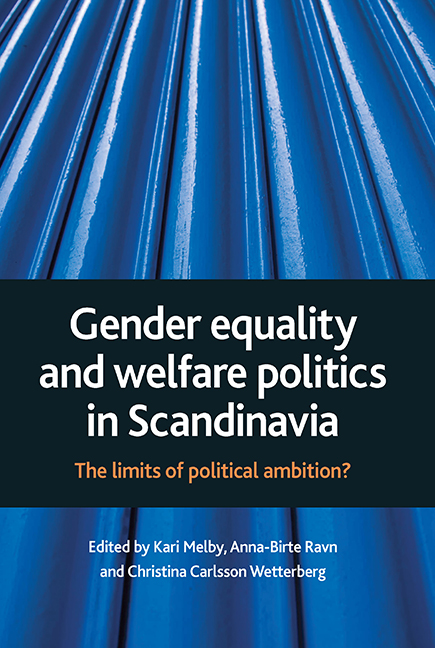Book contents
- Frontmatter
- Contents
- List of tables
- Preface
- Notes on contributors
- A Nordic model of gender equality? Introduction
- Part One Meanings of gender equality in Scandinavian welfare policy
- Part Two Current challenges: competing discourses on gender equality
- Postscript Gender, citizenship and social justice in the Nordic welfare states: a view from the outside
- Postscript Future research on gender equality in the Scandinavian countries
- Appendix Tables 1-10
- Index
seven - From powerful to powerless fathers: gender equality in Danish family policies on parenthood
Published online by Cambridge University Press: 21 January 2022
- Frontmatter
- Contents
- List of tables
- Preface
- Notes on contributors
- A Nordic model of gender equality? Introduction
- Part One Meanings of gender equality in Scandinavian welfare policy
- Part Two Current challenges: competing discourses on gender equality
- Postscript Gender, citizenship and social justice in the Nordic welfare states: a view from the outside
- Postscript Future research on gender equality in the Scandinavian countries
- Appendix Tables 1-10
- Index
Summary
Introduction
From the late 1960s to the mid-1990s Danish family policies on parenthood underwent radical change. The change can be described in terms of equality – as equalising children born out of wedlock with children born in marriage or as equalising unmarried fathers with married fathers and with unmarried mothers. This is not the whole story, however. Beneath this process of equalisation a profoundly new perception of fatherhood and of the position of fathers vis-à-vis mothers evolved: in the 1960s political debates on parenthood constructed unmarried mothers as weak and unmarried fathers as powerful, but in the 1990s this construction was turned upside down. The unmarried father was now portrayed as a victim of discrimination, as the gender most in need of equality. And whereas, in contrast to the mother, the father of the 1960s was primarily a socio-economic and not a socio-emotional or biological figure, the main characteristic of the ‘new father’ of the 1990s (see Annfelt, Chapter Six) was his biological sex.
This chapter analyses the changes in Danish family legislation on custody and visiting rights in respect of children after divorce or partnership break-up, focusing on political discourses on fatherhood and motherhood, gender and equality. The primary sources are parliamentary documents that disclose a clear shift of opinion both within the bourgeois parties and within the parties on the left in Parliament. In the 1960s and 1970s the greatest defenders of the rights of unmarried mothers were parties on the left, but by the 1980s the bourgeois parties came to provide the strongest defence of single mothers’ rights against fathers’ claims to children born out of wedlock. And whereas through the 1980s the preservation of the institution of marriage and the heterosexual family was the primary objective of the bourgeois parties, by the 1990s all political parties agreed that the first obligation of Parliament was to ensure a child's right to both parents, whether the parents were formally married or not.
From the late 1960s the hegemony of the heterosexual family started to dissolve, and the foundation of the Nordic marriage laws of the 1920s (see Carlsson Wetterberg and Melby, Chapter Two) began to quake.
- Type
- Chapter
- Information
- Gender Equality and Welfare Politics in ScandinaviaThe Limits of Political Ambition?, pp. 135 - 148Publisher: Bristol University PressPrint publication year: 2008



